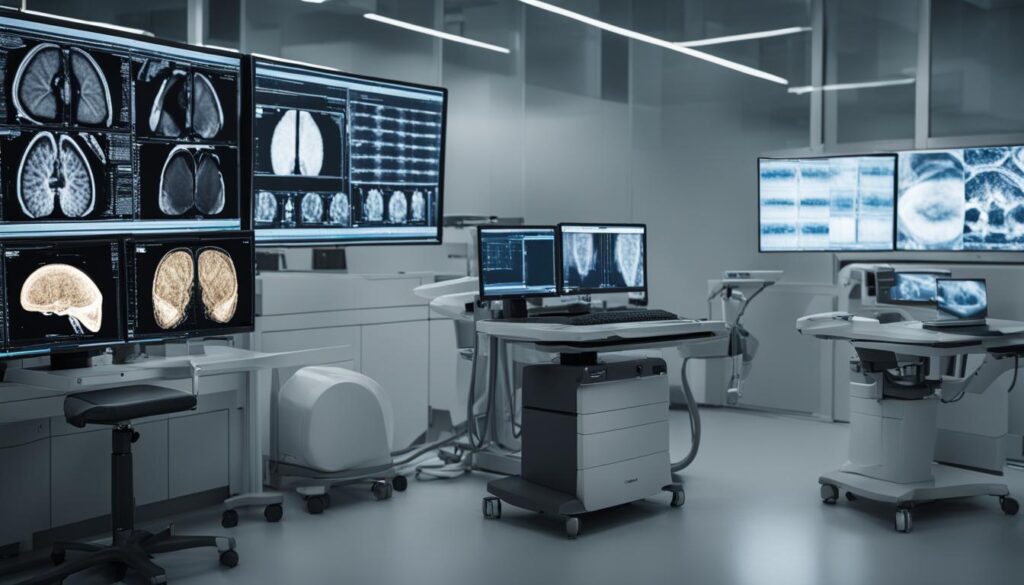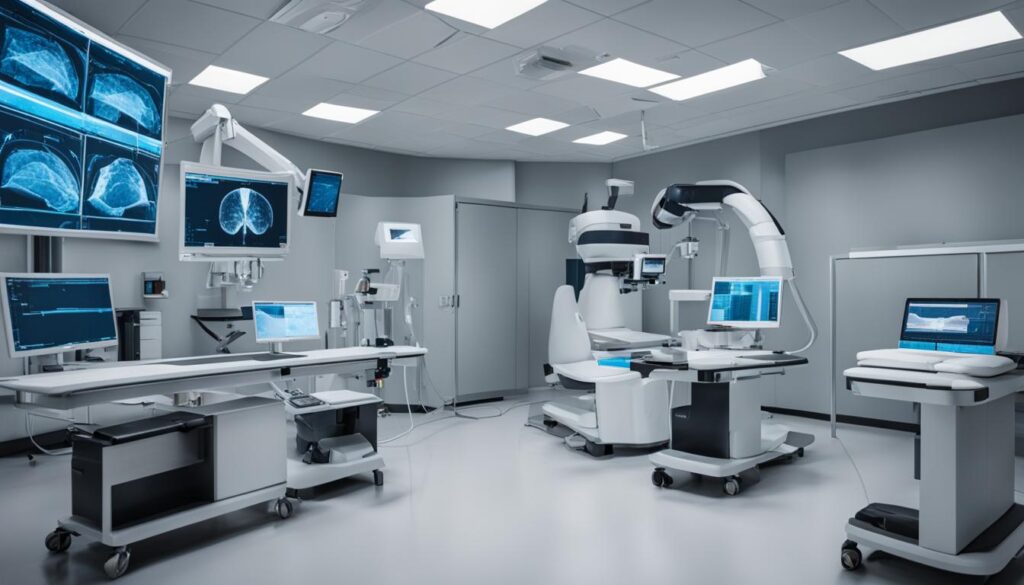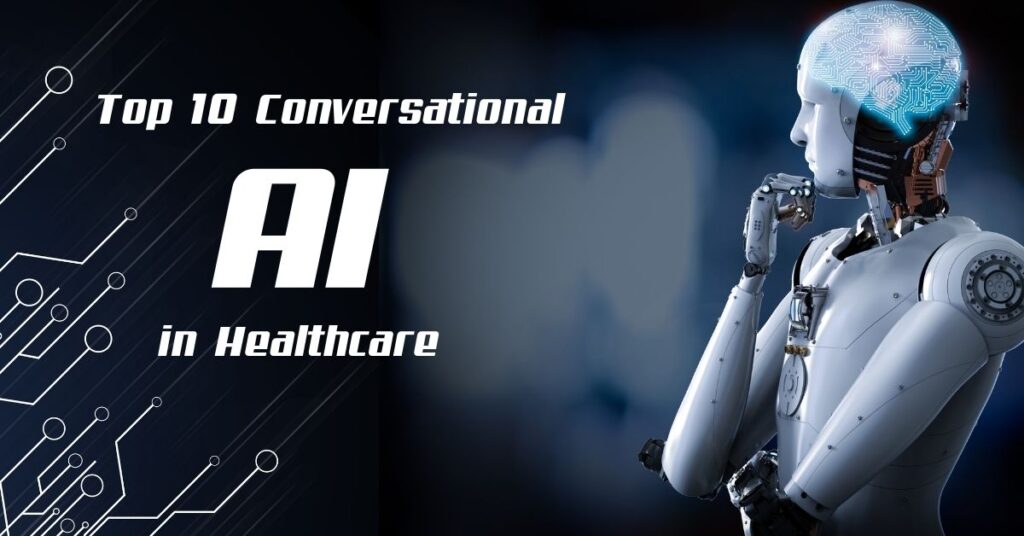
Welcome to our groundbreaking article on the revolutionary impact of Machine learning for medical diagnosis. In this series, we will explore the potential of artificial intelligence (AI) and its applications in transforming the field of medical diagnosis. By leveraging cutting-edge technology, healthcare analytics, and AI algorithms, we are witnessing a new era in patient care and treatment selection.
As we delve into the fascinating world of AI in healthcare, we’ll discuss how it can significantly enhance the accuracy of disease diagnosis and revolutionize treatment recommendations. The integration of machine learning algorithms enables us to analyze vast amounts of patient data, identify patterns, and make data-driven decisions.
Join us as we explore the benefits and challenges of implementing AI in healthcare, including ethical and legal considerations and the need for ongoing human expertise. We’ll also examine the future possibilities of this transformative technology and the advancements it promises for personalized medicine.
Stay tuned for our upcoming sections, where we’ll dive deeper into the potential of AI in disease diagnosis, the power of AI in decision-making, and the challenges of implementing AI in healthcare.
Let’s embark on this exciting journey together and witness how machine learning is revolutionizing healthcare. Discover the untapped possibilities that AI brings to the world of medical diagnosis, as we pave the way for a brighter future in patient care and well-being.
- The Potential of AI in Disease Diagnosis
- AI-assisted Decision-Making in Healthcare
- Challenges and Considerations in Implementing AI in Healthcare
- AI in Healthcare Research and Development
- The Evolution of AI in Healthcare
- Cloud Computing and AI in Healthcare Delivery
- Building Effective AI Systems for Healthcare
- Conclusion
- FAQ
The Potential of AI in Disease Diagnosis
Machine learning has the potential to revolutionize disease diagnosis by leveraging large datasets and identifying patterns that surpass human performance. With advancements in technology, AI tools are transforming the way diseases are detected and diagnosed, leading to improved patient outcomes and more efficient healthcare systems.
Diagnostic Accuracy
One of the key advantages of AI in disease diagnosis is its ability to enhance diagnostic accuracy. By analyzing vast amounts of patient data, machine learning algorithms can identify subtle patterns and indicators of diseases that may be missed by human clinicians. This improved accuracy allows for earlier and more accurate diagnoses, enabling timely interventions and improving patient outcomes.
Data-Driven Healthcare
AI-driven healthcare is inherently data-driven. Through the analysis of big data and electronic health records, AI algorithms can identify trends, correlations, and risk factors associated with various diseases. This data-driven approach enables healthcare providers to make evidence-based decisions, leading to more precise diagnoses and tailored treatment plans.
Computer-Aided Diagnosis
Computer-aided diagnosis is another area where AI is making significant contributions. By analyzing medical images such as mammograms or pathology slides, AI algorithms can assist radiologists and pathologists in identifying abnormalities and making accurate diagnoses. This ability to augment human expertise with AI-driven tools allows for more efficient and effective disease detection.
The potential of AI in disease diagnosis goes beyond improving accuracy. It also holds the promise of reducing healthcare costs, enhancing patient outcomes, and improving overall healthcare delivery. By harnessing the power of machine learning and data-driven healthcare, AI has the potential to transform disease diagnosis, benefiting both patients and healthcare providers.
AI-assisted Decision-Making in Healthcare
Artificial intelligence (AI) is transforming the healthcare landscape by revolutionizing decision-making processes. With the power of predictive modeling and clinical decision support, AI tools can analyze large datasets and provide valuable insights to healthcare providers. These technologies contribute to the advancement of precision medicine and improve patient care across various healthcare settings.
Predictive modeling, one of the key applications of AI in healthcare, enables healthcare professionals to select personalized treatment plans based on patient attributes and treatment context. By analyzing vast amounts of data, machine learning algorithms can predict treatment outcomes, helping doctors make informed decisions. This not only enhances the accuracy of diagnoses but also improves the effectiveness of treatment recommendations.
Predictive Modeling in Precision Medicine
- Allows selection of personalized treatment plans
- Improves accuracy of diagnoses
- Enhances effectiveness of treatment recommendations
In addition to predictive modeling, AI systems also provide clinical decision support to healthcare providers. By analyzing patient data and relevant medical literature, these systems offer evidence-based recommendations for diagnosis and treatment. This helps healthcare professionals make well-informed decisions and ensures that patients receive the most appropriate care.
Clinical Decision Support in Healthcare
- Offers evidence-based recommendations
- Assists in diagnosis and treatment decisions
- Improves patient care and outcomes
With AI-assisted decision-making, healthcare providers can leverage the power of data and technology to optimize patient care. By integrating predictive modeling and clinical decision support into their workflows, healthcare organizations can improve diagnostic accuracy, enhance treatment selection, and ultimately deliver better outcomes for their patients.

Related Post: The Top 10 Conversational AI for Healthcare in 2024
Challenges and Considerations in Implementing AI in Healthcare
The implementation of AI in healthcare brings numerous challenges and considerations that must be addressed to ensure responsible and effective use of this technology. As AI becomes more prominent in medical diagnosis and treatment, it is crucial to navigate these challenges to harness its full potential.
Ethical Considerations
One of the primary concerns surrounding AI in healthcare is the ethical implications. As AI systems make decisions that directly impact patient care, it is vital to establish guidelines and regulations to ensure fairness, transparency, and accountability. Ethical considerations include protecting patient privacy, maintaining patient autonomy, and preventing algorithmic bias that may result in unequal treatment.
Data Privacy
A key challenge in implementing AI in healthcare is safeguarding patient data privacy. With the large amounts of data required to train AI systems, it is crucial to establish robust data protection measures to ensure patient confidentiality. Healthcare organizations must adhere to strict data security protocols and comply with relevant privacy regulations to prevent unauthorized access to sensitive patient information.
Bias
Bias in AI algorithms is another significant concern. AI systems learn from existing data, which may contain biases from historical practices and societal prejudices. Addressing and mitigating algorithmic bias is essential to ensure equitable and unbiased healthcare outcomes. Regular auditing and continuous monitoring of AI algorithms are essential to identify and correct biases that may affect diagnosis or treatment recommendations.
Human Expertise
While AI has the capability to analyze vast amounts of data and assist in decision-making, human expertise remains critical in healthcare. AI systems are tools that should augment human intelligence and not replace it. Healthcare professionals need to possess the necessary knowledge and skills to interpret AI-generated insights and make informed decisions. Collaboration between AI systems and human experts is crucial to ensure the highest level of patient care and safety.
AI in Healthcare Research and Development
AI is revolutionizing healthcare research and development, enabling breakthroughs in fields such as genomics and drug discovery. By analyzing large datasets and identifying patterns, AI technologies are enhancing the accuracy of diagnoses, improving personalized treatment plans, and accelerating the development of innovative solutions.
Genomics
One area where AI is making significant strides is genomics research. By analyzing genetic data, AI algorithms can identify genetic variations associated with diseases and predict individuals’ risk levels. This information can facilitate early detection and intervention, ultimately improving patient outcomes.
Drug Discovery
AI is also transforming the drug discovery process. Through the analysis of vast amounts of biological and chemical data, AI algorithms can identify potential drug candidates more efficiently. This accelerates the identification of new treatments and reduces the time and cost associated with bringing new drugs to market.
Virtual Health Assistants
Virtual health assistants powered by AI are being developed to support clinicians and enhance patient engagement. These assistants can provide personalized health information, answer common medical questions, and support patients in managing their health conditions. By improving access to healthcare information and resources, virtual health assistants contribute to better patient outcomes and increased patient satisfaction.
The Evolution of AI in Healthcare
AI has come a long way in revolutionizing healthcare, transforming from rule-based systems in the past to the current era of machine learning, deep learning, and natural language processing. These advancements have brought about significant breakthroughs in medical diagnostics and treatment.
Machine learning algorithms have greatly improved the performance of AI systems by enabling machines to learn from vast amounts of data and continuously enhance their accuracy and capabilities over time. Deep learning, with its multiple layers of features, has enabled impressive achievements in areas such as image and speech recognition. In the field of oncology, deep learning algorithms have proven particularly effective in analyzing medical images and aiding in cancer diagnosis and treatment.
The Power of Machine Learning
- Machine learning algorithms enhance the accuracy of disease diagnosis by leveraging large datasets and identifying patterns that surpass human performance.
- Deep learning techniques enable breakthroughs in image and speech recognition, with applications in oncology-oriented image analysis and clinical speech recognition.
- Natural language processing advancements improve the understanding of human language and have applications in clinical documentation and research analysis.
These developments in AI, particularly machine learning, deep learning, and natural language processing, have opened up new possibilities for healthcare providers and researchers. By leveraging the power of these technologies, healthcare professionals can make more accurate diagnoses, provide personalized treatment plans, and develop innovative solutions to improve patient care.
Cloud Computing and AI in Healthcare Delivery
Cloud computing is revolutionizing the healthcare industry by enabling the seamless integration of AI technologies. With the ability to store and process vast amounts of healthcare data, cloud computing provides the necessary infrastructure to support AI-driven healthcare systems. By leveraging the power of the cloud, healthcare organizations can analyze large datasets at lower costs and faster speeds, leading to improved patient care and outcomes.
AI-augmented healthcare systems are a prime example of how cloud computing is transforming the delivery of healthcare. These systems combine the capabilities of AI algorithms with cloud-based infrastructure to enable data-driven insights and decision-making. Through AI, healthcare providers can harness the power of predictive modeling, clinical decision support, and precision medicine. Cloud computing ensures that the computational resources required for these AI applications are readily available, scalable, and cost-effective.
The Benefits of Cloud Computing in AI-driven Healthcare
- Scalability: Cloud computing allows healthcare organizations to scale their AI systems based on demand, ensuring that resources can be dynamically allocated to meet changing needs.
- Cost-effectiveness: By leveraging cloud services, healthcare providers can minimize infrastructure costs and only pay for the computing resources they require, reducing the need for costly hardware investments.
- Speed and efficiency: The cloud provides high-speed data processing capabilities, enabling real-time analysis and decision-making. This enhances the efficiency of healthcare delivery and supports timely interventions.
- Data security: Cloud service providers implement robust security measures to protect healthcare data, ensuring its confidentiality, integrity, and availability. This is crucial in maintaining patient privacy and complying with data protection regulations.
The Future of Cloud Computing and AI in Healthcare
As cloud computing technologies continue to evolve, the possibilities for AI in healthcare are endless. From accelerating drug discovery to improving patient diagnostics and personalized medicine, the integration of cloud computing and AI will shape the future of healthcare. By leveraging the power of cloud-based AI systems, healthcare providers can unlock new insights, improve care delivery, and ultimately enhance patient outcomes.
Building Effective AI Systems for Healthcare
Building effective AI systems for healthcare requires a collaborative and human-centered approach. Stakeholder engagement is key to ensuring that the needs and perspectives of healthcare users, multidisciplinary teams, and subject experts are incorporated into the development process. By involving these stakeholders from the beginning, AI solutions can be designed to address real healthcare problems and integrate seamlessly into existing clinical workflows.
Experimentation is also a crucial aspect of building effective AI systems. Through iterative testing and feedback loops with stakeholders, AI tools can be refined, improved, and optimized to meet the specific needs of healthcare settings. This experimentation helps to uncover potential challenges, address ethical and safety implications, and ensure that the AI systems are reliable and efficient in real-world scenarios.
In order to achieve successful implementation, a focus on human-centered AI is essential. This approach combines an understanding of health systems and processes with AI technology, placing the human user at the center of the design. By prioritizing usability and usability, AI systems can enhance the work of healthcare professionals and improve patient outcomes.
Benefits of Stakeholder Engagement and Experimentation in AI Development:
- Ensures that AI solutions are relevant and tailored to the needs of healthcare users.
- Identifies potential issues and challenges early in the development process.
- Enhances the usability and effectiveness of AI systems in real-world healthcare settings.
- Addresses ethical and safety implications through continuous feedback and improvement.
Conclusion
The future of AI in healthcare holds immense potential for revolutionizing disease diagnosis, treatment selection, and patient care. Machine learning for medical diagnosis and the integration of AI into healthcare systems have already demonstrated numerous benefits, such as improved diagnostic accuracy, optimized medication dosages, and personalized treatment plans.
However, the implementation of AI in healthcare also comes with its own set of challenges. Ethical considerations, data privacy, and the ongoing need for human expertise are crucial factors that must be addressed. Discussions surrounding the responsible and ethical use of AI systems in healthcare continue to evolve, emphasizing the importance of transparency, fairness, and accountability.
By building effective AI systems in a collaborative and human-centered manner, healthcare organizations can unlock the full potential of AI technology. Stakeholder engagement, combined with an understanding of health systems, is key in designing AI solutions that address real healthcare problems and seamlessly integrate into clinical workflows. Iterative experimentation and feedback loops with stakeholders help refine AI tools, learn from user experiences, and ensure ethical and safe implementation.
The future of AI in healthcare is promising, with opportunities for innovation and advancements in personalized medicine. As AI technology continues to evolve, it has the potential to play a significant role in transforming healthcare delivery and improving outcomes for patients. By overcoming the challenges and embracing the potential of AI, healthcare organizations can embrace a future where AI-powered systems support and enhance the delivery of high-quality care.
FAQ
What is the potential of AI in healthcare?
AI has the potential to revolutionize healthcare by improving disease diagnosis, treatment selection, and patient care. It can enhance diagnostic accuracy, optimize medication dosages, and establish personalized treatment plans.
What are some examples of AI applications in disease diagnosis?
AI tools can be used for disease detection, such as breast cancer detection using mammograms and skin cancer detection using deep learning algorithms. These tools leverage large datasets and identify patterns that surpass human performance.
How can AI assist healthcare providers in decision-making?
AI can analyze large datasets and predict treatment outcomes, helping doctors select personalized treatment plans based on patient attributes and treatment context. It can also provide clinical decision support, enhancing the accuracy of diagnoses and treatment recommendations.
What are the challenges in implementing AI in healthcare?
Ethical considerations, data privacy, bias in algorithms, and the need for human expertise are some of the challenges associated with implementing AI in healthcare. Addressing these challenges is crucial for responsible and effective use of AI technologies.
How is AI being used in healthcare research and development?
AI is being used to analyze large datasets, identify patterns, and make breakthroughs in fields such as genomics and drug discovery. Virtual health assistants powered by AI are also being developed to support clinicians and improve patient education and engagement.
How has AI evolved in healthcare?
AI has evolved from rule-based systems to the current era of machine learning, deep learning, and natural language processing. Machine learning algorithms have improved AI systems’ performance, and deep learning has enabled breakthroughs in image and speech recognition. Natural language processing has advanced the understanding of human language and has applications in clinical documentation and research analysis.
What is the role of cloud computing in AI integration in healthcare delivery?
Cloud computing provides the necessary computing capacity for analyzing large amounts of healthcare data at lower costs and higher speeds. It enables the development of AI-augmented healthcare systems that leverage data-driven insights to improve the efficiency and effectiveness of care.
How can effective AI systems be built for healthcare?
Building effective AI systems involves stakeholder engagement, including healthcare users, multidisciplinary teams, and subject experts. A human-centered AI approach combines an understanding of health systems with AI technology to address real healthcare problems and integrate into clinical workflows.
What is the future of AI in healthcare?
The future of AI in healthcare holds promising opportunities for innovation and advancements in personalized medicine. By addressing challenges and building effective AI systems, healthcare organizations can leverage AI’s power to transform healthcare delivery and improve outcomes for patients.

